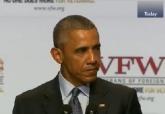President Barak Obama plans to ask Congress for an additional $1 billion for a sweeping effort to cure cancer. The White House Cancer Moonshot Task Force aims to “bring about a decade’s worth of advances in five years.” The task force will include representatives from the VA, DoD, FDA, HHS, National Cancer Institute, National Institutes of Health (NIH), among other agencies. The White House has already outlined the roles for the VA, DoD, and HHS.
The White House specifically referenced 3 VA programs that will play important roles in the initiative. For example, the Million Veteran Program (MVP) includes genetic information from more than 445,000 veterans, and nearly one-third of participants have a cancer diagnosis. According to the White House, MVP may provide a potential rich clinical database for genetic exploration and analyses. Moreover, the Precision Oncology Program (POP), which is part of the Massachusetts Veterans Epidemiology Research and Information Center, has already developed a mechanism to capture genetic information and match patients with appropriate clinical trials. In addition, the VA National Radiation Oncology Program conducts multiple initiatives in cancer research. In all, the VA has nearly 250 research projects related to cancer, which include 170 clinical studies.
With 3 Cancer Centers of Excellence and the Murtha Cancer Treatment Center at the Walter Reed National Military Medical Center, the DoD also will play an important role in the moonshot, according to the White House. The DoD already receives Congressional Special Initiative funding for research, much of which is focused on treatment of highly prevalent forms of cancer or others associated with exposure to hazardous materials that some service members may encounter while on duty.
According to the White House, The Moonshot initiative will begin with a request for $195 million in new cancer activities at the NIH in fiscal year 2016 and another $755 million in mandatory funds for new cancer-related research activities at both NIH and the FDA.
“The goal of this initiative — this ‘Moonshot’ — is to seize this moment,” Biden explained in a blog post announcing the initiative. “To accelerate our efforts to progress towards a cure, and to unleash new discoveries and breakthroughs for other deadly diseases.”
Biden pledged that the federal government “will do everything it possibly can— through funding, targeted incentives, and increased private-sector coordination — to support research and enable progress.” Later this month Biden will meet with cabinet secretaries and heads of relevant agencies to discuss ways to improve federal investment and support of cancer research and treatment.



